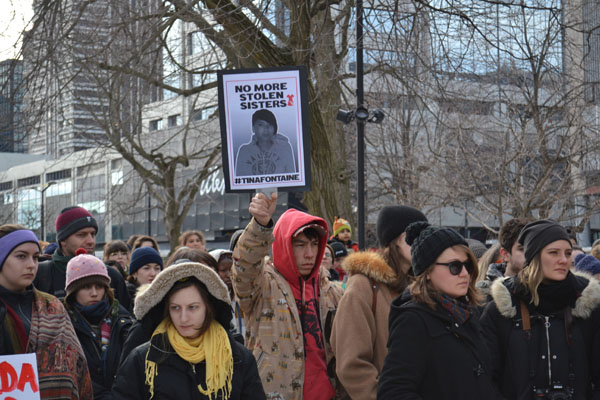Two weeks after Gerald Stanley’s acquittal for the murder of 22-year-old Cree man Colten Boushie in Saskatchewan, a Manitoba courthouse acquitted Raymond Cormier of the murder of 15-year-old Tina Fontaine, member of the Sagkeeng First Nation. Montrealers gathered to mourn Fontaine, Boushie, and other Indigenous people denied justice in Canadian courts at a vigil in Cabot Square on Feb. 24.
Ellen Gabriel, a Kanehsatà:ke activist and the first speaker at the event, emphasized Canada’s culpability in allowing crimes against Indigenous victims to go unpunished.
“The [United Nations] treaty bodies have told Canada that they must implement a process and measures that provide safety and security [for] Indigenous women and girls,” Gabriel said. “And it says that if any private individual inflicts harm upon Indigenous women and girls, then the state is responsible to provide the measures needed to bring the guilty to justice. And it has failed once again.”
The event, which was organized in part by the Native Women’s Shelter of Montreal (NWSM), ended up drawing extensive press coverage and a crowd of about 400 people, according to the CBC. Both NWSM Executive Director Nakuset and Students’ Society of McGill University (SSMU) Indigenous Affairs Commissioner Carlee Kawinehta articulated the need for settlers to educate themselves about Indigenous peoples’ history and lived experiences, both in school and independently.
“I have children, and you wouldn’t believe [what] they’re taught [in school],” Nakuset said. “As someone who runs an organization […] I advocate all the time on behalf of the residents that come in, but I go home and then I have to advocate on behalf of my children. So it never ends when you’re Indigenous, you just have to keep educating and keep advocating all the time.”
Kawinehta added that non-Indigenous McGill students can begin by following the news and reading about initiatives for missing and murdered indigenous women. According to former Minister for the Status of Women and current Minister of Employment Patty Hajdu, Canadian Indigenous women like Fontaine are at disproportionate risk of experiencing violence, and as many as 4,000 have gone missing or been murdered since 1980.
“It’s not a one-time thing, this isn’t a unique case, and [McGill students] should know the names,” Kawinehta said. “I think we’re doing things in the university context, and it’s not working [….] It has to be on a personal level. McGill students, on a personal level, need to learn about these things, reach out to those resources that we have.”
Gabriel also named numerous tools for Canadians to educate themselves, such as the Stolen Sisters report and the Royal Commission on Aboriginal Peoples. She and other speakers delivered resounding calls for change.
“We didn’t riot when the verdict came down for Colten Boushie, and we’re not rioting today, because we are always calling for peace,” Gabriel said. “This is why I’m asking you, as citizens of your country, let’s put politics aside [….] Let’s look at the humanity of this. And let’s bring some changes, some fundamental changes, to respect the human rights of Indigenous children.”
In his speech, Kanehsatà:ke activist and filmmaker Clifton Ariwakehte Nicholas praised the vigil’s large turnout, but stressed that attendance alone would not resolve the issues Canada’s Indigenous communities face.
“I’m happy that there are moral people that still exist in this country, that you’re here today,” Nicholas said. “I’m here because I want to incite you to action. I want you to be loud, to be consistent with your loud voices. Talk about justice. I am completely sickened by what I’ve been witnessing. Just a week ago, I was here talking about Colten Boushie, and [now] I’m here again.”









